#jojoba oil for acne
Explore tagged Tumblr posts
Text
Ayurvedic Oils for Planetary Energy: Enhancing Wellness and Balance ✨🌿
In the ancient wisdom of Ayurveda, oils are not just nourishing elixirs for the body but also potent carriers of planetary vibrations, offering a holistic approach to wellness and balance.

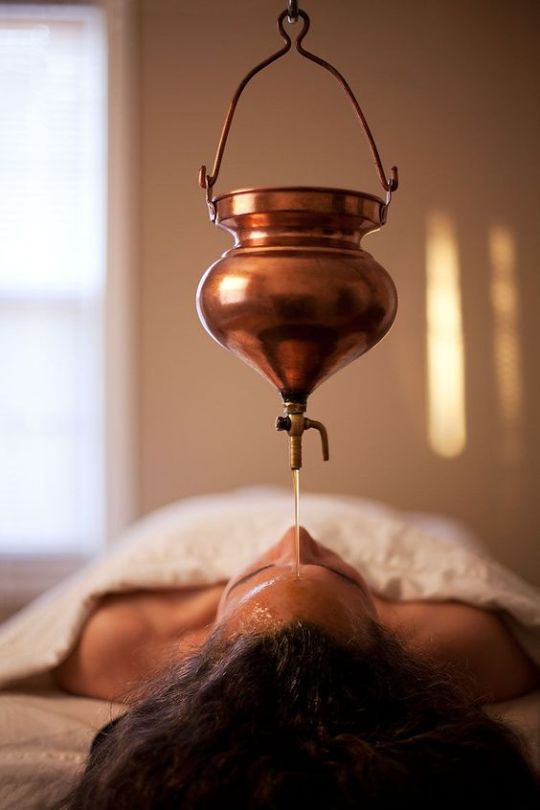
1/Sun Energy: Coconut Oil
Benefits: Harness vitality and strength with coconut oil. Its nourishing properties promote healthy skin, hair, and digestion, enhancing overall vitality and radiance.
How to Use: Incorporate coconut oil into daily cooking, skincare, and hair care routines for a boost of energy and vitality.
2/ Moon Energy: Almond Oil
Benefits: Embrace nurturing and soothing energy with almond oil. Its moisturizing qualities calm the mind and nourish the skin, promoting emotional well-being and tranquility.
How to Use: Massage almond oil onto the skin before bed or add a few drops to bathwater for a relaxing and rejuvenating experience.
3/ Mars Energy: Sesame Oil
Benefits: Channel fiery energy with sesame oil. Its warming properties stimulate circulation, boost immunity, and promote courage and strength.
How to Use: Use sesame oil for self-massage (abhyanga) or as a cooking oil to invigorate the body and mind.
4/ Mercury Energy: Jojoba Oil
Benefits: Embody communicative energy with jojoba oil. Its balancing properties support clear thinking, mental agility, and adaptability.
How to Use: Apply jojoba oil to the scalp and hair for hydration and balance, or use it as a carrier oil for essential oil blends to enhance focus and concentration.
5/ Jupiter Energy: Grapeseed Oil
Benefits: Align with expansive energy with grapeseed oil. Its light texture and antioxidant properties support growth, prosperity, and optimism.
How to Use: Use grapeseed oil as a moisturizer or massage oil to promote vitality and well-being, or add it to homemade skincare products for a radiant complexion.
6/ Venus Energy: Rosehip Seed Oil
Benefits: Embrace harmonious energy with rosehip seed oil. Its rejuvenating properties promote beauty, love, and creativity, nurturing inner and outer radiance.
How to Use: Apply rosehip seed oil to the face and body to reduce signs of aging and promote a glowing complexion, or use it as a natural alternative to moisturizers and serums.
7/ Saturn Energy: Castor Oil
Benefits: Embody disciplined energy with castor oil. Its detoxifying properties promote endurance, responsibility, and resilience.
How to Use: Use castor oil for oil pulling or as a massage oil to promote detoxification and grounding, or apply it to the scalp and hair for nourishment and strength.
8/ Rahu Energy: Neem Oil
Benefits: Harness transformative energy with neem oil. Its purifying properties help release toxins and negative patterns, promoting clarity and spiritual growth.
How to Use: Use neem oil as a natural remedy for acne or fungal infections, or incorporate it into skincare products for its antibacterial and antifungal properties.
9/ Ketu Energy: Frankincense Oil
Benefits: Embrace mystical energy with frankincense oil. Its grounding properties support meditation and introspection, promoting spiritual insight and inner peace.
How to Use: Diffuse frankincense oil during meditation or add it to skincare products for its rejuvenating and calming effects, promoting overall well-being and spiritual growth.
Incorporate these Ayurvedic oils into daily life to align with planetary energy, enhance well-being, and promote balance and harmony. 🪔🌿
113 notes
·
View notes
Text
how to deal with purging skin?
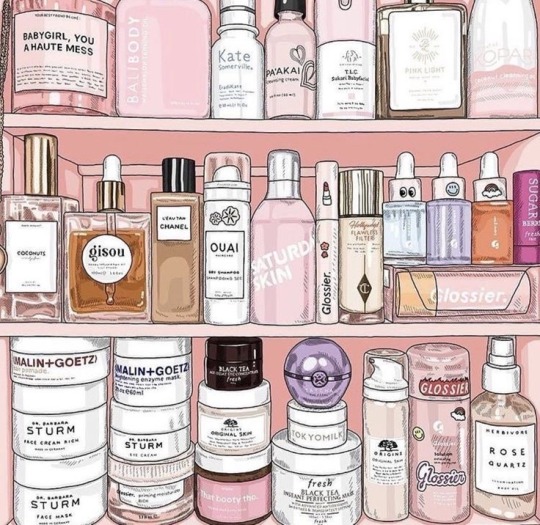

What is purging skin?
This is a phenomenon that occurs when you integrate a new treatment concentrated in exfoliating active ingredients (AHA, BHA, vitamin C or retinol…) into your routine. These active ingredients will eliminate all dead skin on the surface and bring out the imperfections.
how to deal with purging skin?
First of all, remember that purging is a sign that the products are working, so don't stop or give up! Also there is no need to consult a dermatologist.
be patient: the skin purge only lasts a few days or even a few weeks depending on your skin type and the severity of the purge. It is important to be patient and give your skin the time it needs to adapt.
consult a dermatologist: there is no such thing as consulting a dermatologist; he or she will be able to assess the situation and recommend treatments and adjustments to your routine.
Avoid Breaking Out Your Acne: It is essential to avoid touching your face directly. Touching your face increases your chances of growing bacteria, and interfering with the purging process can make the breakout worse or longer.
Add ingredients that support the skin barrier: You can add soothing products to your skin to treat purging Peptides: rebuild the skin barrier and increase the suppleness of the skin. Their anti-inflammatory characteristics contribute to even skin tone, relief of inflammation and restoration of the skin.
Ceramides: help form the skin barrier, which protects the skin and also hydrates the skin.
Hyaluronic acid: stores water and keeps skin hydrated and plump. This reduces the visibility of fine lines and wrinkles.
Jojoba Oil: is a light oil rich in vitamins E, D and A, as well as vitamin B complex, copper and zinc. These nutrients protect the skin from free radicals and keep it healthy.
Aloe vera: calms, hydrates and relieves acne-prone skin.
Oat Oil: Has the ability to function as a barrier between the skin and the environment. It also contains antifungal, anti-inflammatory, and calming effects that can help increase skin hydration.
Don't forget about hydration: Adequate hydration is essential to maintain the skin's balance and reduce the risk of irritation. Use a lightweight, non-comedogenic moisturizer to keep your skin hydrated.
Protect your skin from the sun: During skin purging your skin may be susceptible to sun damage. Use a broad-spectrum sunscreen with an appropriate SPF to protect your skin.
#self care#skincare#healthy skin#dream girl#high maintenance#it girl#self development#self love#becoming that girl#it girl energy#wonyoungism#dream girl tips
103 notes
·
View notes
Text
My favorite makeup and skincare products ♡˖꒰ᵕ༚ᵕ⑅꒱


1. Revlon - Super Lustrous Lipstick, shade Rum Raisin
2. Rom&nd Better Than eyeshadow palette
3. Flower Beauty Powder Blush, shade Warm Hibiscus
4. Wangy Milk Tea eyeshadow palette
5. CoverGirl Clean Matte Liquid Foundation, shade 505 Ivory
6. BBIA Waterproof Gel Eyeliner, shade 03 Rose Brown
7. Maybelline The City Mini eyeshadow palette, shade Skyscape Dusk
8. Maybelline New York ColorSensational Lipstick, shade Hooked On Pink
9. Dew You Boo Setting Spray
10. Maybelline New York Fit Me Liquid Concealer, shade Ivory


1. St. Ives Green Tea and Bamboo Blackhead Clearing Scrub
2. St. Ives Acne Control Apricot Scrub
3. Neutrogena Pink Grapefruit Facial Cleanser
4. L'Oreal Retalift Hyaluronic Acid Serum
5. Dickinson's Pore Perfecting Toner
6. Nivea Soft Moisturizing Cream with Jojoba Oil and Vitamin E
#lesbian#lesbian blog#wlw blog#queer#lesbo#dyke#queer community#wlw#sappho#dykeposting#hyper feminine#femme lesbian#femme dyke#high femme#makeup routine#makeup#Princess Talk
13 notes
·
View notes
Text


NOT SPONSORED JUST A PSA FROM A GIRLY GIRL ✨💅🏻
My hair type: I have straight, fine, low porosity, bleach damaged hair. it’s so so important to research what products go for what hair types.
(if you don’t bleach then remove the k18/olaplex products from this list. )
When I oil my scalp i use a blend of rosemary, vitamin E, jojoba (my queen), and mint oil on my scalp, and the derma e oil listed above and argan oil on my mids to ends, i don’t leave it much longer than 3 hours before washing. Look up which oils are best for your hair type before getting started bc you could do more harm than good.
My skin type is sensitive. I used to think i was oily bc of my acne but it turned out that BHAs and AHAs (salicylic acid and benzoyl peroxide etc) were too strong for my skin and making my skin worse. also i was over exfoliating with manual exfoliators as chemical exfoliators. simplifying my routine and using products without harsh ingredients is what really changed my skin. figuring out your skin type is half the battle.
I also use a free app called Yuka to check if products have gross or harmful ingredients bc i’m paranoid.
My credentials:






context:
Hair: first set is 2015-2024, second set is 2021-2023
Skin: First pic is me from HS (yikes) second is from 2020 when i started my first skincare routine. that is a good example of what my skin looked like 24/7 365.
the bottom two are from the last month, the first has no makeup or filter. Yes i have a little foundation in the last pic before yall call me out.
MORE IMPORTANT THAN THE PRODUCTS YOU USE IS CONSISTENCY!
90% OF DAMAGE IS MECHANICAL DAMAGE WHICH MEANS DAMAGE THAT YOU PHYSICALLY CREATE YOURSELF! (while showering, brushing, sleeping, styling etc) BE GENTLE WITH YOUR HAIR AT ALL TIMES AND ALWAYS PROTECT IT WHILE YOU SLEEP! HAIR IS MOST SENSITIVE WHILE WET SO NEVER GO TO BED WITH WET HAIR AND BRUSH IT THROUGH BEFORE YOU GET IT WET!
I recommend getting a wet brush and a silk/satin scarf to wear at night, or to wear a loose braid on a satin pillowcase. (I also use a silk scarf to curl my hair overnight with no heat.)
If anybody has questions feel free to message me!
#hair#skin#skincare#acne#hair care#hair journey#skin journey#bleach damage#me#self#blonde#help#recommendations#girly girl#self care#skincare routine#hair routine#hair help#skincare help#cosmetics#my routine#beauty#health#wellness#kbeauty#girls girl
2 notes
·
View notes
Text
The Benefits of Incorporating a Sugar Scrub into Your Skincare Routine
Sugar scrubs have gained popularity as a key step in many skincare routines, and for good reason. These natural exfoliants offer a range of benefits that go beyond just smoothing your skin. Let’s dive into why you should consider adding a sugar scrub to your skincare regimen.
1. Effective Exfoliation for Smoother Skin
One of the primary benefits of a sugar scrub is exfoliation. The fine granules of sugar gently slough off dead skin cells, helping to unclog pores and improve overall texture. This process not only leaves your skin feeling soft and smooth but also encourages the growth of fresh, healthy skin cells.
Regular exfoliation with a sugar scrub can prevent issues like ingrown hairs and dry patches, and even help reduce the appearance of acne by keeping pores clear.
2. Natural Hydration and Nourishment
Unlike harsh exfoliants, sugar scrubs are known for their moisturizing properties. Sugar is a natural humectant, which means it draws moisture from the environment into the skin, helping to keep it hydrated. Most sugar scrubs are infused with nourishing oils like coconut oil, almond oil, or jojoba oil, which deeply moisturize the skin as you exfoliate.
The combination of exfoliation and hydration helps restore the skin’s natural moisture barrier, making it ideal for those with dry or sensitive skin.
3. Improved Blood Circulation and Radiance
When you massage a sugar scrub onto your skin, it stimulates blood flow, enhancing circulation. This increased blood flow helps bring oxygen and nutrients to the skin’s surface, promoting a healthy, natural glow. Improved circulation can also lead to reduced swelling and puffiness, particularly around the face or delicate areas like the eyes.
Incorporating a sugar scrub into your routine before showering or during a bath allows you to enjoy these circulation-boosting benefits, leaving your skin looking vibrant and refreshed.
4. Brightens and Evens Out Skin Tone
Over time, dead skin buildup can lead to a dull complexion and uneven skin tone. Sugar scrubs help promote cell turnover, encouraging fresh, new skin cells to come to the surface. This process can diminish the appearance of dark spots, hyperpigmentation, and blemishes, leaving your skin brighter and more even-toned.
For those looking to achieve a radiant complexion, using a sugar scrub 1-2 times per week can make a noticeable difference.
5. Gentle Enough for All Skin Types
One of the reasons sugar scrubs are so popular is that they are gentle on the skin. The granules are small and dissolve easily with water, making them less abrasive than other exfoliants like salt scrubs or walnut shell scrubs. This makes sugar scrubs a safe option for sensitive or delicate skin types.
By choosing a scrub with natural ingredients and oils, you can reduce the risk of irritation while enjoying the benefits of exfoliation and hydration.
6. Promotes Better Absorption of Skincare Products
Regular exfoliation with a sugar scrub removes dead skin cells that can create a barrier on the skin’s surface. By eliminating this buildup, your skin becomes more receptive to other skincare products. This means that moisturizers, serums, and oils can penetrate more effectively, maximizing their benefits.
If you’re investing in quality skincare products, using a sugar scrub helps ensure you’re getting the most out of them!
7. Reduces the Appearance of Cellulite and Blemishes
Massaging a sugar scrub into areas prone to cellulite can help improve circulation and tone the skin’s appearance. While it won’t eliminate cellulite completely, regular use of a scrub can temporarily reduce its appearance, making your skin look firmer and smoother. The hydrating oils in the scrub can also help reduce dryness and blemish scars over time.
8. Creates a Relaxing Self-Care Experience
Incorporating a sugar scrub into your skincare routine is more than just a physical benefit—it can also provide a relaxing self-care experience. The gentle massaging action combined with the pleasant scents of sugar scrubs (like lavender, citrus, or vanilla) can help relieve stress and tension.
Taking the time to care for your skin with a soothing sugar scrub can be a great way to unwind at the end of a long day or to rejuvenate yourself in the morning.
Tips for Using a Sugar Scrub
Don’t Overdo It: Limit exfoliation to 1-2 times per week to avoid irritation.
Moisturize Afterward: After using a sugar scrub, apply a rich moisturizer or body lotion to lock in the hydration.
Choose Quality Ingredients: Opt for sugar scrubs made with natural oils and free from artificial fragrances to avoid irritation.
Conclusion
A sugar scrub is a versatile and gentle skincare product that can transform your skin by providing exfoliation, hydration, and radiance. Whether you’re looking to brighten your complexion, even out your skin tone, or simply enjoy a luxurious self-care moment, incorporating a sugar scrub into your routine is a simple yet effective way to achieve smoother, healthier-looking skin.

#SugarScrub#ExfoliateAndGlow#NaturalSkincare#GlowingSkin#SelfCareRoutine#SmoothSkinGoals#SkinCareBenefits#HydrateAndExfoliate#SkincareEssential#RadiantSkin#GentleExfoliation#SelfCareSunday#HealthySkin#SkincareTips#NaturalBeauty
3 notes
·
View notes
Text
Oregano Oil for Skin & Hair Care
Benefits for Skin Care
Reduces Inflammation
Oregano oil’s anti-inflammatory properties are particularly beneficial for skin health. It helps to soothe irritated skin, reduce redness, and calm conditions such as acne and eczema. The carvacrol and thymol in oregano oil work to diminish inflammation, promoting a more balanced and comfortable complexion.
Acne Relief: Oregano oil can help alleviate acne symptoms by reducing inflammation and combating the bacteria that contribute to breakouts.
Eczema Soothing: For those with eczema, oregano oil can provide relief by calming inflamed skin and reducing itching.
Fights Free Radicals
Oregano oil’s powerful antioxidant content helps combat free radicals, which are known to accelerate the aging process. By neutralizing these harmful molecules, oregano oil helps protect the skin from premature aging, reducing the appearance of fine lines and wrinkles.
Anti-Aging Benefits: Regular use of oregano oil can help maintain youthful skin by preventing oxidative damage that leads to aging signs.
Skin Protection: Its antioxidant properties also help shield the skin from environmental stressors, such as pollution and UV rays.
Improves Skin Health
In addition to reducing inflammation and fighting free radicals, oregano oil enhances overall skin health by supporting cellular repair and regeneration. It contributes to a clearer, more radiant complexion and can improve skin texture.
Enhanced Texture: Oregano oil can help smooth out rough patches and improve skin
Radiant Glow: By promoting healthy skin cells, oregano oil supports a naturally radiant and glowing appearance.
Incorporating oregano oil into your skincare routine can provide these significant benefits, helping to achieve and maintain healthy, vibrant skin.
Benefits for Hair Care
Promotes Healthy Scalp
A healthy scalp is the foundation for strong, vibrant hair, and oregano oil can play a crucial role in maintaining scalp health. Its antimicrobial and anti-inflammatory properties help address common scalp issues such as dandruff and irritation.
Reduces Dandruff: Oregano oil helps control dandruff by reducing inflammation and eliminating the fungi that can contribute to flakiness.
Soothes Scalp Irritation: Its calming effects can alleviate itching and discomfort associated with scalp conditions.
Strengthens Hair
Oregano oil not only supports scalp health but also contributes to stronger, more resilient hair. By nourishing the hair follicles and reducing oxidative stress, oregano oil helps prevent hair breakage and supports overall hair growth.
Prevents Breakage: Strengthening hair from the roots helps reduce the likelihood of breakage and split ends.
Supports Growth: A healthy scalp environment encourages hair growth and can improve the thickness and density of your hair.
Adds Shine and Luster
Regular use of oregano oil can enhance the natural shine and luster of your hair. By promoting overall hair health and repairing damage, oregano oil helps your hair look more vibrant and full of life.
Improves Appearance: Adds a healthy shine to hair, making it look more vibrant and lustrous.
Enhances Texture: Helps smooth and soften hair, improving its overall texture and manageability.
Incorporating oregano oil into your hair care routine can lead to healthier, shinier hair while also addressing common scalp issues. Whether used topically or as a supplement, oregano oil offers valuable benefits for achieving and maintaining beautiful hair.
How to Use Oregano Oil for Skin and Hair
Topical Applications
Oregano oil can be applied directly to the skin or scalp to harness its benefits. However, due to its potent nature, it's important to use it properly to avoid irritation.
Dilution: Always dilute oregano oil with a carrier oil, such as coconut or jojoba oil, before applying it to the skin. A common ratio is 2-3 drops of oregano oil per tablespoon of carrier oil.
Patch Test: Conduct a patch test on a small area of skin to check for any adverse reactions before applying it more broadly.
Application for Skin: Gently apply the diluted oregano oil to affected areas, such as acne spots or dry patches, using a cotton ball or clean fingertip.
Application for Scalp: Massage the diluted oil into your scalp to address dandruff or irritation. Leave it on for 10-15 minutes before washing it out with a mild shampoo.
Dietary Supplements
In addition to topical applications, oregano oil can also be taken as a dietary supplement. GreenPeople offers Oregano Oil Capsules that provide a convenient way to incorporate oregano oil into your daily routine.
Benefits of Capsules: GreenPeople’s oregano oil capsules are formulated to deliver the beneficial compounds of oregano oil internally, supporting overall health and wellness.
Dosage and Usage Instructions: Follow the recommended dosage on the product label or as advised by a healthcare Typically, one capsule is taken daily with a meal.
Consistency: For best results, incorporate oregano oil capsules into your daily routine and combine them with a balanced diet and healthy lifestyle practices.
By using oregano oil both topically and as a supplement, you can maximize its benefits for skin and hair care, achieving optimal results and supporting overall well-being.
#health#self care#vegan#oregano#nutrition#plants#greenpeople#green#environment#skincare#long hair#supernatural#life#supplements#healthcare
2 notes
·
View notes
Text
And the sponsor of my good mood, Jojoba metallic oil.
Metallic Jojoba oil, no trace of acne
(I say all kinds of nonsense)
5 notes
·
View notes
Text
Go From Wrinkled to Youthful Skin With The Best Anti-Aging Skin Care Routine

There is no escape from aging. Even your favourite celebs, who have access to the best anti-aging regimen and procedures in the world, eventually show their age! And, while there is no way to completely stop the process, there are certainly ways to slow it down and maintain a youthful appearance for as long as possible.
Yes, wrinkles form and skin become dryer, but it doesn’t have to be the end of the world. With a solid skincare routine in place, you can defy Father Time and keep your skin radiant AF. So, if you're looking for the best anti-aging skin care routine, keep reading!
What Causes Aging?
As we get older, our skin begins to display signals of wear and tear. Wrinkles, fine lines, and age spots can make us look older than we really are. But why does that happen?
There are many external factors that can cause premature aging, including sun damage, smoking, pollution, and an unhealthy diet. But the main cause of aging skin is actually an internal one: the natural process of cell turnover.
Every day, our skin cells go through a cycle of growth and repair. As we get older, this process starts to slow down, and our skin cells don't regenerate as quickly. Moreover, our skin also lowers collagen and elastin production, and the fatty tissues below our skin decrease in size and volume. All this leads to the loss of our ability to retain moisture and the formation of those nasty visible signs of aging.
Best Skincare for Aging Skin: Your New Secret Weapon
When it comes to skincare, there are a lot of products and routines that promise to keep your skin looking young and glowing. But with all of the different options available, how do you know which ones are really effective?
Here are our secret anti-aging routines that will work wonders for you. So grab a pen and get ready to smooth those wrinkles!
A.M. Anti-Aging Skincare Routine
So, you wake up, look in the mirror, see those wrinkles and fine lines looking back at you, and you want to do something about it, right? This is how your A.M. anti-aging routine should look like:
1. Water-Based Cleanser
A water-based cleanser is crucial for anyone over the age of 30. This type of gentle cleanser will help to remove any dirt, oil, or sweat that has built up on your skin overnight. It helps to prep your skin for the rest of your anti-aging routine by getting rid of dead skin cells. Using these anti-aging products helps to remove impurities and keep your face moisturized, which is important because dehydration can lead to the formation of fine lines and wrinkles.
2. Toner
A toner helps to restore the skin's pH balance, which is essential for keeping the skin healthy and preventing wrinkles. It also helps to remove any remaining dirt that may be clogging pores, preparing your complexion for the next step.
3. Antioxidant Serum
Antioxidant serums, like l-ascorbic acid (aka vitamin C), moisturize and help protect the skin from environmental stressors by neutralizing free radicals before they can cause damage. Additionally, these anti-aging ingredients can help brighten the skin and give it a more youthful appearance.
4. Spot Treatment
Whether it's a wrinkle cream, eye cream, or salicylic acid to treat acne, apply your chosen spot treatment to address specific skin concerns.
5. Moisturizer
Moisturizers help to keep the skin hydrated and plump, which can reduce wrinkles and the appearance of aging skin. Using a moisturizer with SPF during the day can provide sun protection. Opt for creams or gels with powerful ingredients like niacinamide, vitamin C, or hyaluronic acid.
6. Facial Oil (Optional)
Including a facial oil can be beneficial, especially if you have dry skin. Jojoba oil is very similar to our own natural sebum, making it easily absorbed. It's also packed with antioxidants and vitamins that help protect the skin from damage.
7. Sunscreen
No matter your skin type, finish your morning skin care routine by applying a pea-sized amount of sunscreen on your face. Important: you can skip this step if your moisturizer has SPF.
P.M. Anti-Aging Skincare Routine
The night has come, and it is time to start layering your beauty products on your face. But what’s the correct order? Let us enlighten you:
1. Makeup Remover
Whether you choose micellar water or wipes, makeup remover is a must! Just always remember to do it gently without tearing your skin too much.
2. Double Cleansing
Double cleansing means using an oil-based cleanser first to break down makeup, sunscreen, and dirt, followed by a water-based cleanser to remove any lingering impurities. This ensures your skin is truly clean, which is key to preventing premature aging.
3. Exfoliating (Not Always)
You can choose physical exfoliants, like sugar scrubs, or chemical exfoliants with active ingredients like lactic acid or glycolic acid. Important: only perform this step once or twice a week, as over-exfoliating can cause irritation and dry out your skin.
4. Toner
You can use the same toner as your morning routine! Just soak a cotton pad in it and tap it gently on your skin.
5. Retinol
Retinol should only be used at night because it can make your skin more sensitive to the sun. It helps to increase collagen production and cell turnover, promoting the growth of new, healthy cells.
6. Serum
Serums loaded with active ingredients like hyaluronic acid or niacinamide penetrate deep into the skin, making them effective at night when your skin is more receptive to repair and regeneration.
7. Face Masks
Apply rinse-off masks before serums and leave-on masks at the end of your routine. Choose masks with hyaluronic acid or retinoids.
8. Spot Treatments and Eye Creams
Use eye cream to smooth signs of crow’s feet and hydrate the area, and spot treatments to heal acne and other concerns.
9. Moisturizer
Opt for a moisturizer with hyaluronic acid, vitamin C, or any other antioxidant to make your skin feel soft, young, and healthy.
Anti-Aging Skin Care Products: Where to Find Them?
Now that you know the best anti-aging skin care routine, it’s time to put it into practice. Head over to Storyderm and find the perfect products for your individual needs. We have a wide variety of top-rated brands and all-natural solutions that will help you achieve younger-looking skin.
Don’t wait any longer – start taking care of your skin today!
2 notes
·
View notes
Text
Glow Naturally: Transform Your Skincare Routine with Organic Products
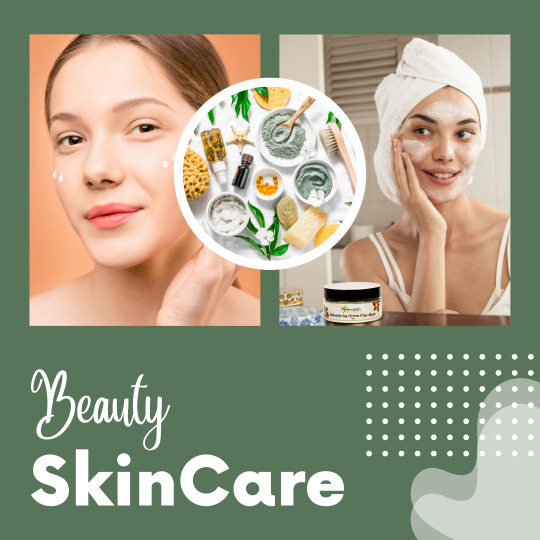
In today's fast-paced world, achieving radiant and healthy skin is not just a desire but a necessity. Our skin is the largest organ of the body, serving as a protective barrier against environmental aggressors. With the constant exposure to pollutants, UV radiation, and other harmful factors, maintaining a proper skincare routine has become indispensable. However, the choice of skincare products is equally crucial, as they directly impact our skin's health and appearance. In recent years, there has been a significant shift towards using organic products, driven by a growing awareness of the benefits they offer. In this comprehensive guide, we will explore how you can transform your skincare routine with organic products, unlocking the secrets to naturally glowing skin.
Understanding Organic Skincare
Organic skincare revolves around the use of natural ingredients derived from plants, herbs, and other organic sources. Unlike conventional skincare products that may contain synthetic chemicals and artificial fragrances, organic products are formulated with ingredients that are cultivated without the use of pesticides, herbicides, or genetically modified organisms (GMOs). The fundamental principle of organic skincare lies in harnessing the power of nature to nourish and rejuvenate the skin while minimizing exposure to potentially harmful substances.
The Science Behind Organic Ingredients
Organic skincare products are not just a trend; they are backed by scientific research that validates their efficacy. Natural ingredients such as botanical extracts, essential oils, and plant-based antioxidants possess unique properties that benefit the skin. For instance, ingredients like aloe vera, chamomile, and green tea are known for their soothing and anti-inflammatory effects, making them ideal for sensitive or irritated skin. Additionally, organic oils like jojoba, argan, and rosehip oil are rich in essential fatty acids and vitamins, providing deep hydration and nourishment without clogging pores.
Common Organic Ingredients
One of the key advantages of organic skincare is the abundance of beneficial ingredients it offers. From potent antioxidants to skin-replenishing vitamins, organic products are packed with nutrients that promote skin health. Here are some commonly used organic ingredients and their benefits:
Aloe Vera: Renowned for its moisturizing and healing properties, aloe vera helps soothe sunburns, reduce inflammation, and promote skin regeneration.
Coconut Oil: With its antimicrobial and antioxidant properties, coconut oil is a versatile ingredient that moisturizes the skin, fights acne-causing bacteria, and prevents premature aging.
Hyaluronic Acid: Derived from natural sources such as rooster combs or fermentation of yeast, hyaluronic acid is a hydrating powerhouse that retains moisture in the skin, improving elasticity and firmness.
Shea Butter: Extracted from the nuts of the shea tree, shea butter is rich in vitamins A, E, and F, making it an excellent emollient for dry, dehydrated skin. It also has anti-inflammatory properties that soothe irritation and promote skin repair.
Transitioning to an Organic Skincare Routine
Making the switch to organic skincare may seem daunting at first, but with the right approach, it can be a rewarding journey towards healthier skin. Here are some tips to help you transition seamlessly:
Do Your Research: Take the time to educate yourself about organic skincare brands, ingredients, and certifications. Look for products that are certified organic by reputable organizations such as USDA or COSMOS to ensure their authenticity and quality.
Start Slowly: Begin by incorporating one or two organic products into your existing skincare routine and gradually expand from there. This allows your skin to adjust to the new ingredients and prevents potential sensitivities or reactions.
Read Labels Carefully: Pay attention to the ingredient list on skincare products and avoid those containing synthetic fragrances, parabens, sulfates, and other harmful chemicals. Opt for products with simple, transparent formulations that prioritize natural ingredients.
Listen to Your Skin: Everyone's skin is unique, so it's essential to pay attention to how your skin responds to different products. If you experience any irritation or discomfort, discontinue use and try a different product or formulation.
The Environmental Impact of Organic Skincare
In addition to benefiting your skin, choosing organic skincare products can also have positive implications for the environment. Organic farming practices promote biodiversity, reduce soil erosion, and minimize the use of synthetic pesticides and fertilizers, which can contaminate water sources and harm wildlife. By supporting brands that prioritize sustainability and eco-conscious packaging, you can minimize your carbon footprint and contribute to a healthier planet.
DIY Organic Skincare Recipes
For those who prefer a hands-on approach to skincare, creating homemade organic products can be a fun and rewarding experience. With simple ingredients readily available in your kitchen, you can whip up luxurious treatments tailored to your skin's needs. Here are a few DIY recipes to get you started:
Hydrating Honey Mask: Mix one tablespoon of raw honey with one teaspoon of coconut oil and a few drops of lavender essential oil. Apply to clean, dry skin and leave on for 15-20 minutes before rinsing off with warm water.
Gentle Exfoliating Scrub: Combine equal parts of finely ground oats and organic yogurt to create a gentle exfoliating scrub. Massage onto damp skin in circular motions, then rinse thoroughly with lukewarm water.
Nourishing Body Butter: Melt together equal parts of shea butter, cocoa butter, and coconut oil in a double boiler. Once melted, add a few drops of your favorite essential oil for fragrance, then pour into a clean container and allow to cool and solidify.
Addressing Challenges and Misconceptions
Despite the numerous benefits of organic skincare, there are still some misconceptions and challenges associated with it. Here are a few common myths debunked:
Organic Products are Less Effective: While some may perceive organic skincare as less potent than conventional products, many organic ingredients have been scientifically proven to deliver results comparable to their synthetic counterparts.
Organic Skincare is Expensive: While organic skincare products may have a higher upfront cost compared to mass-market brands, they often offer better value in the long run. Investing in high-quality, nutrient-rich formulations can lead to healthier skin and fewer skincare issues over time.
Organic Skincare is Only for Certain Skin Types: Organic skincare is suitable for all skin types, including sensitive, oily, dry, and combination skin. With a diverse range of products available, there is something for everyone, regardless of their skin concerns.
Organic Skincare for Different Skin Types
When it comes to organic skincare, one size does not fit all. Each skin type has unique needs and requires specific ingredients and formulations to address them effectively. Here's how to tailor your organic skincare routine to your skin type:
Dry Skin: Look for rich, nourishing products that contain hydrating ingredients like hyaluronic acid, shea butter, and avocado oil. Avoid harsh cleansers and opt for gentle, creamy formulations that replenish moisture without stripping the skin.
Oily Skin: Choose lightweight, non-comedogenic products that help regulate oil production and minimize pores. Ingredients like tea tree oil, witch hazel, and salicylic acid are beneficial for balancing oily skin and preventing breakouts.
Sensitive Skin: Opt for fragrance-free, hypoallergenic products formulated
to be gentle on sensitive skin. Look for soothing ingredients such as chamomile, oatmeal, and calendula, which help calm inflammation and reduce redness. Patch testing new products before full application can help prevent adverse reactions and irritation.
Incorporating Organic Skincare into Your Lifestyle
Beyond just skincare products, adopting an organic skincare routine is part of a holistic approach to wellness. Here are some ways to integrate organic skincare into your lifestyle:
Eat a Healthy Diet: Nutrient-rich foods such as fruits, vegetables, and whole grains provide essential vitamins and antioxidants that support skin health from the inside out. Incorporating organic produce into your diet ensures that you're minimizing exposure to pesticides and other harmful chemicals.
Stay Hydrated: Drinking an adequate amount of water is crucial for maintaining hydrated and radiant skin. Opt for filtered or spring water whenever possible to avoid contaminants commonly found in tap water.
Practice Sun Protection: Protecting your skin from the sun's harmful UV rays is essential for preventing premature aging and reducing the risk of skin cancer. Choose organic sunscreen formulations that use mineral-based ingredients like zinc oxide or titanium dioxide, which provide broad-spectrum protection without harmful chemicals.
Practice Mindful Living: Stress can take a toll on your skin, leading to breakouts, inflammation, and other skin issues. Incorporate relaxation techniques such as meditation, yoga, or deep breathing exercises into your daily routine to promote inner calm and reduce stress-related skin problems.
Case Studies and Testimonials
The effectiveness of organic skincare is best illustrated through real-life experiences. Here are some inspiring stories from individuals who have experienced remarkable transformations with organic products:
Sarah's Story: After struggling with sensitive, acne-prone skin for years, Sarah decided to switch to organic skincare products. Within weeks of using gentle, natural formulations, she noticed a significant improvement in her skin's texture and clarity. Now, Sarah enjoys a radiant complexion without the need for harsh chemicals or medications.
Michael's Testimonial: As a busy professional constantly exposed to environmental pollutants and stress, Michael's skin began to show signs of premature aging and fatigue. Upon discovering the benefits of organic skincare, he revamped his routine with antioxidant-rich serums and moisturizers. The result? Firmer, more youthful-looking skin that reflects his inner vitality.
The Future of Organic Skincare
The future of skincare is undoubtedly green. With consumers becoming more conscientious about the ingredients they put on their skin and the impact of their purchasing decisions on the environment, the demand for organic skincare is expected to continue rising. Here are some trends and innovations shaping the future of organic skincare:
Clean Beauty Movement: The clean beauty movement emphasizes transparency, sustainability, and safety in skincare formulations. Brands are increasingly focusing on clean, non-toxic ingredients and eco-friendly packaging to meet consumer demands for ethical and responsible products.
Technology Integration: From advanced extraction techniques to biodegradable packaging solutions, technology is playing a significant role in the evolution of organic skincare. Innovations such as plant stem cell technology, green chemistry, and 3D printing are revolutionizing the way organic products are formulated, packaged, and delivered to consumers.
Personalized Skincare: With advancements in AI and data analytics, personalized skincare solutions tailored to individual skin concerns and preferences are becoming more accessible. Brands are leveraging technology to analyze skin data, formulate custom blends, and track progress over time, offering consumers a personalized and effective skincare experience.
Conclusion
In conclusion, organic skincare offers a natural and sustainable approach to achieving radiant, healthy skin. By harnessing the power of nature and avoiding harmful chemicals, organic products nourish and rejuvenate the skin, leaving it glowing from within. Whether you're dealing with acne, dryness, or premature aging, there's an organic solution for every skin concern. By embracing organic skincare practices and incorporating them into your lifestyle, you can not only enhance your skin's appearance but also contribute to a cleaner, greener planet.
#organic skincare#moisturizer#healthyskin#clean beauty#ecofriendly#greenbeauty#holistic skincare#diy skincare#sustainableliving
4 notes
·
View notes
Text
Great Butters and Oils for your Homemade Body Care
Here is my personal list of amazing additions to your homemade body care! Hopefully this can be some inspiration for your own recipes.
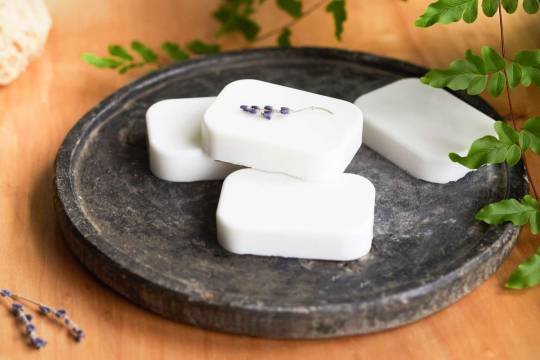
Olive Oil, Extra Virgin, Organic (EVOO)
Olive oil is high in polyphenols, squalene, and sterols. It is highly emollient and helps with inflamed skin conditions.
Cocoa Butter
Cocoa butter is actually a solid fat that comes from cocoa beans. It adds a good hardness to your soap bars, however you don't want to use more than about 15% in any recipe.
Macadamia Nut Oil
This oil is high in monounsaturated fatty acids, and like jojoba oil, it is similar to the natural oils created by our own skin. It will turn rancid more quickly than other oils, so if you plan on using macadamia nut oil, you might want to purchase it in smaller amounts.
Castor Oil
This oil is wonderful for creating an excellent lather in soaps.
Shea Butter
Shea butter is a softer butter than cocoa butter. It contains nutrients that are not affected by the saponification process when making soap.

Jojoba Oil
This oil is wonderful for dry and oily skin types. It gives a great protective barrier for over-washed hands or dry skin. It is also noted to help with acne, dermatitis, inflamed skin conditions, and oily skin conditions.
Sweet Almond Oil
Almond oil is extremely high in Vitamin E, and although it is decently emollient, it's also highly moisturizing!
Pumpkin Seed Oil
This oil is quickly absorbed, doesn't clog pores, but at the same time is highly moisturizing for your skin! It’s high fatty acid content makes it amazing for both dry and oily skin.
Argan Oil
Argan oil can be pretty expensive, besides creating a softer bar, so only 10% or less should be used for making soap. In recent years argan oil has really come into the spotlight for its potential to promote hair growth, and it’s anti-aging and anti-inflammatory properties.
Grape Seed Oil
This is a lightweight oil that is very high in anti-oxidant plant compounds. It's slightly astringent and emollient, meaning it soaks into your skin well and makes it great for homemade body care!
Hemp Seed Oil
This oil is great for soothing and healing the skin, due to being very high in fatty acids.
Rice Bran Oil
This oil is very hydrating and nourishing for the skin. Used topically, rice bran oil works to improve circulation and even out skin tone by brightening the complexion.
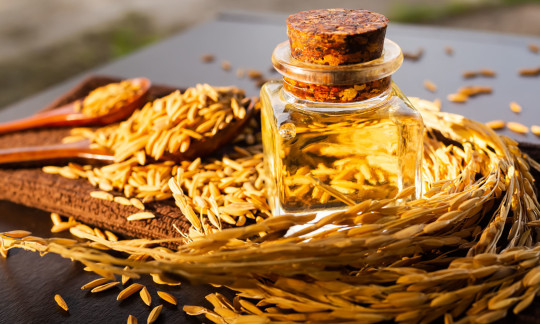
#green witch#kitchen witch#kitchen witch recipe#green witch recipe#hearth witch#hearth witch recipe#soap making#witch#wicca#witchy#witchcraft
14 notes
·
View notes
Text
A-Z Cheaters Guide to Facial Oils
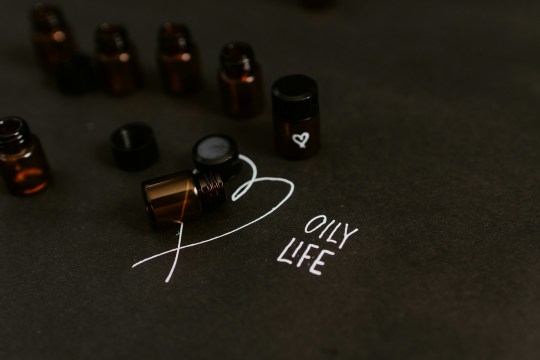
Image Credit: Kelly Sikkema on Unsplash
I put together this quick guide with some basic information on single-source oils used in skincare. This is not a comprehensive list of all oils used in skincare, just a list of those commonly used as single-source oils. Some oils have more abundant information than others.
As a review, single-source facial oils are used to add moisture and restore skin's natural barrier. To use, you can add a few drops to your favorite moisturizer and mix in your hands prior to application or you can use oils on their own. Simply put a few drops in your palm to warm, then apply a thin layer to skin.
Some of these oils are quite common and can be found in your average grocery store. Others might only be available from specialty retailers, health food stores, and the like. Remember to check and make sure whatever you're buying is organic and has no additives.
CLICK BELOW FOR A-Z FACIAL OILS AND THEIR PROPERTIES.
Acai
Loaded with vitamins and antioxidants
Good for aging skin
Almond
High in Vitamin E, Zinc, proteins, and potassium
Lighter than olive oil and shea butter
Absorbs easily
Can cause allergic reaction
Soothes dry, irritated skin
Good for regenerating damaged skin cells
Good for dry, acne-prone, and sensitive skin
Apricot
High in Vitamin E and fatty acids
Absorbed easily
May help soften and calm irritated, itchy skin; good for acne prone skin
Anti-inflammatory, antioxidant, anti-aging, antiseptic, and antibacterial
Argan
Good for dry, dehydrated skin
High in Vitamin A and E, monounsaturated fatty acids
May help with the appearance of wrinkles, fading scars, skin texture, and treating acne
Doesn't clog pores
Avocado
High in oleic acid, a monounsaturated fatty acid, and other essential and trace minerals
Good for dry, damaged skin
May increase sebum production
Not recommended for acne-prone skin
Can reduce pore size and remove impurities
Reverse signs of aging
Improve conditions like psoriasis and eczema
Carrot Seed
Antifungal, antibacterial, and anticancer qualities due to flavonoid content
Improves elasticity, tone, and overall appearance
Calms irritated skin; may help with eczema and psoriasis
Slows signs of aging
Castor
Strong purging and detoxing properties
May help with acne; increases cell turnover
Can be drying for some skin types due to ricinoleic acid content
Chia Seed
Works well for all skin types including oily and irritated skin; especially beneficial for sensitive, inflamed, dehydrated skin
Rich with omega-3s and -6s and antioxidants
Patients suffering from xerotic eczema who used a simple cream with 4% chia seed oil for eight weeks found significant relief
Decreases transepidermal water loss
Do not use if allergic to chia seeds
Coconut
Available in two forms: solid or liquid
Do not use refined coconut oil on skin
Absorbs easily
High in Vitamin E and K, fatty acids, and polyphenols
Antifungal, anti-inflammatory, and antibacterial properties
Not good for those with acne
Stimulates collagen production
Evening Primrose
Good for aging skin
Promotes elasticity, anti-inflammatory, enhances skin's cellular structure
Helps lighten skin and reduce hyperpigmentation
May help with acne and balancing hormones when taken orally; often used in menopausal women
Grapeseed
High in Vitamin E, fatty acids
Antioxidant, antimicrobial, anti-inflammatory properties
Good for oily skin
Reduces redness
Helps heal acne scarring
Tones and tightens skin
Protects against sun damage
Reduces the appearance of wrinkles, stretch marks, and blemishes
Hemp Seed
Good for oily skin
Great for dry, itchy skin, psoriasis, and eczema
Tolerated by both oily and sensitive skin
Can help balance oil production
Reduces redness and inflammation caused by acne
Jojoba
Good for dry, dehydrated skin
Technically a wax, not an oil
Mimics skin's sebum (natural oils)
May help reduce oil-production in oily skin, basically by tricking it into thinking it's produced enough; can make a good acne treatment
Absorbed easily
Doesn't clog pores
Marula
Good for dry, dehydrated skin
High in antioxidants
Protects from environmental toxins
Reduces signs of aging and sun damage
Soothing for all skin types
Olive
Slightly heavier moisturizer
Typically doesn't trigger allergic reactions
Can cause/worsen atopic dermatitis for some
High in Vitamins A (natural retinoid), D, E, and K; fatty acids and plant sterols
Antioxidant-rich
Smooths skin texture
Reduces signs of aging, inflammation, and redness
Heals dry skin
Pumpkin Seed
Good for oily skin
Has DHT-blocking properties
Rich in zinc and selenium
Great for fighting acne-causing bacteria
Low chance of clogging pores
Increases firmness
Rosehip
High in Vitamin A (natural retinoid) and C, fatty acids, and other antioxidants
Recommended for sensitive skin, anti-aging
Possible use for eczema
Good for oily, dry, damaged, mature, and irritated skin
May help reverse the effects of sun damage
Improves skin texture
Helps with signs of aging, stretch marks, scars, and hyperpigmentation
Safflower
High in linoleic acid
Great at treating blackheads and other skin impurities
Sesame Seed
Promotes wound healing
Kills acne-causing bacteria
Has great antibacterial properties
Protects against sun damage
Helps skin texture and overall appearance
Allergen risk
Shea Oil/Butter
Available in two forms: solid or liquid
Excellent moisturizer; highly protective against rough skin during dry, cold months
Reduces inflammation; soothes distressed skin
Sunflower Seed
Absorbed easily
High in Vitamin E
Protects skin barrier
Antimicrobial properties
Doesn't cause/worsen atopic dermatitis
Good for irritated skin
Good for most skin types
Balances, moisturizes, and fights signs of aging
Squalane
Lightweight
Derived from sugarcane
Good for sensitive skin
Absorbs easily
Tamanu
Comes from a tree in the pine/evergreen family; strong, pine-like scent
Amazing healing properties
Great for acne spot treatment, healing and fading acne scars
Can be used to fade other types of scarring as well
Good for delicate skin
2 notes
·
View notes
Text

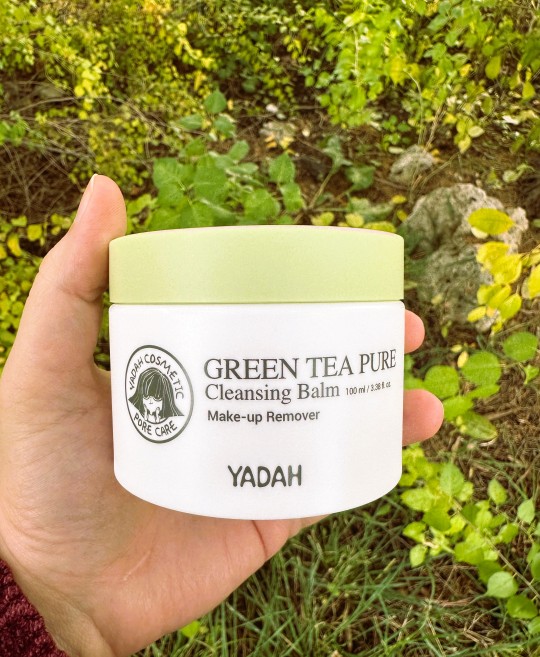
Review of YADAH's Green Tea Pure Cleansing Balm
YADAH is a Korean brand that cares about the health of your skin and the planet. They aim to make products from the best and safest natural ingredients. Their Green Tea Pure Cleansing Balm is designed to remove fine dust and oil in addition to heavy makeup, it’s designed in particular for sensitive skin. Key ingredients include 0.3% of green tea leaf powder (improves skin complexion, anti-aging, soothing, tones skin), olive fruit oil (moisturizing, anti-aging, healing, anti-inflammatory, anti-wrinkle, gently exfoliating), sunflower seed oil (moisturizing, vitamin-rich, anti-aging, treats dry skin), lavender oil (detoxifying, anti-acne, healing, skin toning, brightening) and tocopherol (strengthens skin, increases moisture, improves elasticity, moisturizing). This product retails for between $14-22 USD, you can get it here for $14.94 + shipping.
Ingredients
Olea Europaea (Olive) Fruit Oil, Cetyl Ethylhexanoate, Ethylhexyl Palmitate, Caprylic/Capric Triglyceride, PEG-20 Glyceryl Triisostearate, Beeswax, Helianthus Annuus (Sunflower) Seed Oil, Water, Phenoxyethanol, Butylene Glycol, Camellia Sinensis Leaf Powder (0.3%), Simmondsia Chinensis (Jojoba) Seed Oil, Ethylhexylglycerin, Citrus Limon (Lemon) Peel Oil, Citrus Medica Vulgaris (Citron) Peel Oil, Citrus Grandis (Grapefruit) Peel Oil, Citrus Aurantium Dulcis (Orange) Oil, Citrus Nobilis (Mandarin Orange) Peel Oil, Lavandula Angustifolia (Lavender) Oil, Eucalyptus Globulus Leaf Oil, Rosmarinus Officinalis (Rosemary) Leaf Oil, Tocopherol, Citrus Aurantium Dulcis (Orange) Flower Oil
To quickly note, I received this for free from Picky and YADAH in exchange for my honest review.

The balm contains 100 ml (3.38 oz) and doesn’t have a noticeable fragrance, but it does contain many essential oils.

The balm is pretty standard and doesn’t feel too heavy.

It's pretty oily and does start to break down to a more liquid form pretty fast.

It removes makeup very nicely and is non-stripping.
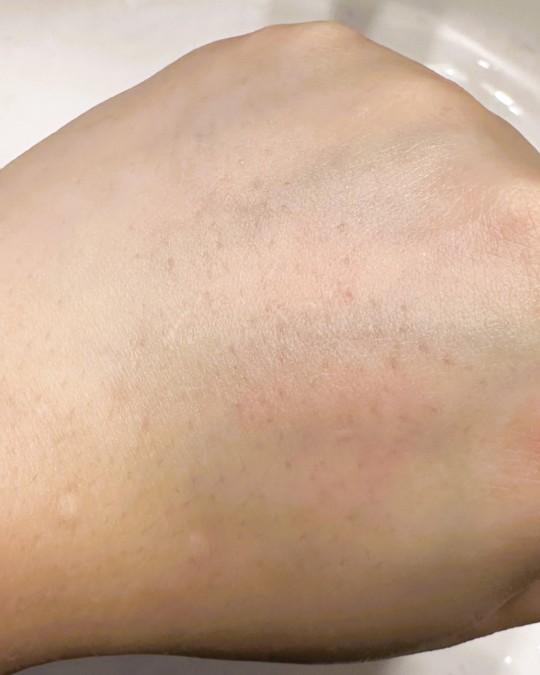
It doesn’t leave any oil residue once rinsed off.
Recommended use is to place an appropriate amount on dry hands and face and gently massage into the skin. It’s easy to rinse off or remove with tissue paper. It’s recommended to follow up with a cleansing foam. This is specifically formulated for sensitive skin. After using, so there are many essential oils in the ingredients list so this product is not fragrance-free. The physical fragrance isn't very noticeable, however. The cleansing balm has a very easy texture to work with and despite having a fair amount of irritants, this is a very gentle product that is suitable to any skin type, even to sensitive skin as I didn't personally notice any irritation. The ingredients are all very helpful in the skin maintaining moisture without being stripping or leaving a film or residue behind. I found this worked really well to remove dirt and gunk from my pores as well, it's also been gentle around my recent nose piercing. It's great to use as a double cleanse, both steps really help you feel clean without leaving the skin tight. I'd recommend this to anyone with dry, sensitive skin with enlarged pores.
What I like: this balm is very gentle, non-irritating, non-stripping and doesn't leave any film or residue. It's effective at removing dirt and oil and makeup is really nice to help loosen extra dirt from the pores. What I don't like: while it didn't affect me, there are several essential oils in this which can be irritants.
Pros:
Non-stripping
Gentle
Breaks down makeup easily
Removes dirt and oil effectively
Sensitive skin friendly
Doesn't leave a film or residue
Cons:
Contains irritants
Would I buy this?
Yes
Rating: 8/10
3 notes
·
View notes
Note
Can I ask what you use for your own skin? <3
Sure 🫶🏾
For my face (alongside purr tea tree oil)




For my Body (alongside some almond or jojoba oil at times, and feet creams lol)





For ref: I have dry sensitive skin, with a history of eczema. But otherwise, genetically I’m pretty lucky — no pimples/spots/acne etc. (Only occasionally hormonal pimples) 💎
6 notes
·
View notes
Text
Busting Common Skincare Myths: What Truly Works and What Doesn't
In the pursuit of radiant and flawless skin, it's easy to get lost in a maze of skincare myths and misconceptions. From homemade remedies to supposed miracle products, the beauty industry can sometimes leave us bewildered. Let's dive into some prevalent skincare myths, setting the record straight on what's effective and what's not.
Myth: The More, the Merrier
Reality: Layering multiple products may seem enticing, but quality trumps quantity. Overloading your skin can lead to irritation and clogged pores. A personalized routine catering to your skin type - including a cleanser, moisturizer, sunscreen, and targeted treatment if necessary - is the way to go.
Myth: Natural Means Safe
Reality: Just because something is labeled "natural" doesn't guarantee it's safe for all skin types. Allergies and reactions can still occur. It's crucial to read labels, patch-test, and consult a dermatologist before incorporating new products.
Myth: Pores Open and Close
Reality: You might have heard that steam opens pores while cold water closes them. In truth, pores lack muscles, so they can't change shape. Steam can temporarily soften debris, but a solid cleansing routine and exfoliation work better for maintaining clear pores.
Myth: Oily Skin Rejects Moisturizers
Reality: Hydration benefits all skin types, including oily ones. Skipping moisturizer can lead to increased oil production. Opt for a lightweight, oil-free moisturizer to maintain balance without causing breakouts.
Myth: Sunscreen Is for Sunny Days Only
Reality: Sunscreen is a must, no matter the weather. Harmful UV rays are present even on cloudy days and can penetrate windows. Consistent broad-spectrum sunscreen application safeguards your skin from premature aging and damage.
Best sunscreens EVER:
La Roche-Posay Anthelios Melt-in Milk Body & Face Sunscreen
LIVE TINTED Hueguard Invisible Sunscreen Stick SPF 50
Neutrogena Invisible Daily Defense Face Sunscreen + Hydrating Serum with Broad Spectrum SPF 60+
Myth: Exfoliating Daily for Perfection
Reality: Exfoliation aids in cell turnover, but excess can cause irritation. 2-3 times a week with a gentle exfoliant is sufficient for a smoother complexion without harming your skin's barrier.
Amazing Facial Exfoliants:
Dermalogica Daily Microfoliant - Exfoliator Facial Scrub Powder
TULA Skin Care So Poreless Exfoliating Blackhead Scrub
M-61 PowerGlow® Peel- 30 Treatments
Myth: Moisturizers and Oils Aggravate Acne
Reality: Acne-prone skin thrives with hydration. Seek non-comedogenic, oil-free options. Some oils, like jojoba or rosehip, can even regulate sebum and enhance skin appearance.
Moisturizers I personally love:
Paula’s Choice C5 Super Boost Moisturizer with 5% Vitamin C
e.l.f. SKIN Holy Hydration!
CeraVe Moisturizing Cream | Body and Face
TATCHA The Dewy Skin Cream
In conclusion, navigating through the world of skincare requires discerning fact from fiction. An informed approach, coupled with a streamlined routine, is the key to glowing skin. When in doubt, a dermatologist's guidance can be invaluable on your skincare journey. Remember, debunking skincare myths is an essential stride towards achieving your skin's best version.
#beauty#beauty products#skincare#skin care#skincare routine#skincare tips#skincareproducts#skincareessentials#moisturizer#exfoliation#exfoliant#healthyskin#glowing skin#glowingskin#skincarejourney#skincarejunkie#beauty tips
3 notes
·
View notes
Text
i am going to scream! does anyone w curly white people hair know how to deal w this shit--- i put a tinsy bit of jojoba oil on it while i was drying it w a dryer bc i was trying to diffuse it & now my bangs are GREASY nad i feel ridiculous! but my hair was so frizzy before! and it's barely even curling!
also if anyone had/has like uber bad acne pls give me tips bc boy puberty is being a dickhole to me & i have a giant ouchie pimple on my chin & my coworker who struggled bad w acne's advice was "use like dove bar soap & water and no moisturizer & drink a shitton of water & maybe work out so your pores push out the yuck" and ,,,,, that does not feel like it will work for my fatass
3 notes
·
View notes
Text
Get glowing skin with these top 5 natural ingredients
Looking for a way to give your skin a healthy, natural glow? Look no further than your organic skincare products! The beauty industry is buzzing with the benefits of using natural ingredients, and for good reason. These ingredients can nourish, hydrate, and protect your skin in a way that synthetic ingredients simply cannot. Here are the top 5 natural ingredients you should look for in your organic skincare products.
Aloe vera:
This succulent plant is a powerhouse of skin benefits. It's known for its soothing, hydrating, and anti-inflammatory properties, making it a great choice for anyone with dry, irritated, or sensitive skin. Look for products that contain a high concentration of aloe vera, such as a moisturizer or a face mask. To use, simply apply the product to your skin and let it absorb for a few minutes before rinsing off.
Jojoba oil:
Unlike many other oils, jojoba oil is very similar to the natural oils produced by our skin. This makes it a great choice for anyone with oily or acne-prone skin, as it can help regulate oil production without clogging pores. Jojoba oil is also very gentle on the skin and can be used as a standalone moisturizer or added to your existing moisturizer for an extra boost of hydration.
Tea tree oil:
This essential oil is known for its antibacterial and antifungal properties, making it a great choice for anyone with acne or other skin blemishes. Tea tree oil can be added to a facial toner or used as a spot treatment to help fight breakouts. It's important to note that tea tree oil should be used in small concentrations and diluted with a carrier oil, as it can be irritating to the skin in its pure form.
Rosehip oil:
This oil is packed with antioxidants, vitamins, and fatty acids that nourish and repair the skin. It's particularly effective at reducing the appearance of scars and fine lines, making it a great choice for anyone with aging skin. Look for a serum or face oil that contains rosehip oil and apply it to your skin after cleansing and toning.
Green tea extract:
This powerful antioxidant is known for its ability to protect the skin from free radicals and other environmental stressors. It also has anti-inflammatory properties, making it a great choice for anyone with sensitive or acne-prone skin. Look for a facial mist or serum that contains green tea extract and use it before applying your moisturizer to give your skin an extra boost of protection.
Incorporating natural ingredients into your skincare routine can be a great way to give your skin the TLC it deserves. However, it's important to remember that natural ingredients may not work for everyone, and it's always a good idea to patch test new products and consult with a dermatologist if you have any concerns. With these top 5 natural ingredients, you'll be well on your way to achieving healthy, glowing skin.
#organicskincare#naturalbeauty#skincareingredients#aloevera#jojobaoil#teatreeoil#rosehipoil#greenteaextract#glowingskin#beautysecrets#healthyskin#naturalskincare#plantbasedbeauty#veganbeauty#crueltyfreebeauty#skincaretips#skincareblog#beautyblog#tumblrbeauty#beautycommunity
9 notes
·
View notes